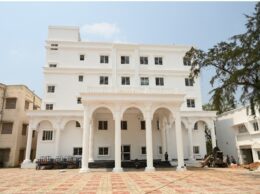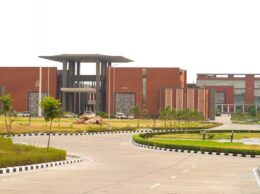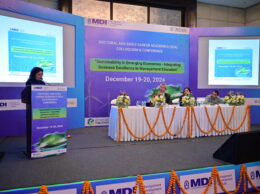By Surya Prakash Mohapatra, 15 August 2021: Today we are celebrating the 75th Anniversary of India’s Independence. On this special occasion, I am overwhelmed with a desire to reflect on India’s journey as an Independent Nation. What has been our journey like over the last 75 years? What is the true meaning of Independence? Has every Indian understood it? Are we enjoying the fruits of Independence? Let’s reflect on these questions:
Are we truly Independent?
To many the word ‘Independent’ means ‘not dependent on anyone else’. But does this definition hold good? Can anyone ever be truly ‘not dependent’ on others? In order to come to this world, we depended on our parents. As we grew up, we depended on our parents, elders, teachers, friends and many others in our environment. Today the dress we wear is stitched by someone else. The food we eat is cooked by someone else. The books we read have been written by others. The house where we stay has been constructed by someone else. The road we walk on has been built by others. In reality, in every step of our life, we are dependent on others. How are we independent then?
What is the meaning of Independence?
Prominent world teacher, Sree Sree Thakur Anukulchandra has dispelled all myths about Independence. According to him, to survive and grow we need to depend on each other and there lies the essence of Independence. He says, “A progressive inter-dependence among individuals is Independence.”
The best way to understand this concept of Inter-dependence is to look at the human anatomy. Our body systems are inter-connected and dependent on each other to function. Our heart doesn’t beat unless our brain tells us to do so. Our respiratory system relies on our circulatory system to deliver the oxygen it gathers, while the muscles of our heart cannot function without the oxygen they receive from our lungs. The bones of our skull and spine protect our brain and spinal cord, but our brain regulates the position of our bones controlling our muscles.
What we can learn from the Human Body?
Every organ in our body is unique and distinct. In our physical body, the nose is always a nose, never eyes; the hand is always a hand, it is never a leg. Each is different in form and function. The hands perform their job diligently and the ears perform theirs. No organ tries to perform the tasks cut out for another organ. Yet, despite their differences in shape and function, there is harmony among them, a unity in variety. Each organ is dependent on other organs to function efficiently and effectively. If one organ is affected, other organs get affected too. The two tenets of this Inter-dependent Human Body structure are:
- Distinctiveness (Each organ is unique.)
- Inter-interestedness (Organs support each other.)
The Universe operates the way the Human Body does
Human Body is a replica of the Universe. The human body, just like the entire universe, is made up of five elements, viz., earth, water, fire, air and space. What is true of the HUMAN BODY is also true of the UNIVERSE. In the Universe, every human being (like every organ in the human body) is distinct and unique. Each human being is different from every other, but each has the inner tendency to find that unity and inter-interestedness in all this diversity and in this lies of joys of creation. The distinct qualities of every human being are his or her innate capabilities acquired from parents and forefathers through genes. These distinct qualities acquired from forefathers get further developed and strengthened with persistent efforts and dedication by descendants through generations.
Ancient Indian Society was an Inter-dependent Society
Innate abilities (distinct qualities) of human beings were highly valued in the ancient society. These innate abilities were the wealth of our nation. Because of this, India was prosperous in every field including business, administration, warfare, art and craft and Spirituality. Every individual and community understood the uniqueness they possessed. Everyone knew their responsibilities towards others. The rulers knew that their responsibility was to provide good governance. The warriors knew that their job was to safeguard the nation. The entrepreneurs knew that their responsibility was to provide high quality goods and services to all at just price. Farmers knew that their duty was to produce good crops and feed the nation. No one infringed upon anyone else’s area of work. Like different organs in the body work in tandem, every family and section of the society worked in harmony with every other family or section of the society. Inter-interestedness and collaboration were spontaneous in everyone. This was the bedrock of unity and integration in the Indian Society. This integration gave India its strength and power.
When we lost our Inter-dependence, we lost our Independence
When the Moghuls and Britishers entered India, at the beginning they attacked the two aforesaid fundamental tenets of Inter-dependence, namely, Distinctiveness and Inter-interestedness. Britishers lured Indians to take up English Education so that they can become white collar babus (glorified clerks). Common Indians fell prey to the temptation of earning some quick money and acquiring (so called) social status. In the process, Indians lost their innate abilities and expertise in various fields. Inter-dependence gave way to unhealthy cut- throat competition. India which was then one of the most prosperous nations in the world, came under the clutches of empirical designs. And India lost her Independence.
How can we regain our lost Independence?
We need to reverse the process of disintegration of the Indian Society which have experienced through centuries of subservience. According to Sree Sree Thakur Anukulchandra, in order to bring back the glory of India’s past, we need to reconstruct the five pillars of the society. They are:-
- Ideal Centric Human Life
- Ideal Education
- Ideal Marriage
- Agriculture
- Industry
Ideal Centric Human life will endow human beings with strong character and personality.
Ideal Education will strengthen innate qualities and instincts of human beings.
Ideal Marriage will ensure biological supremacy through better progeny.
Agriculture and Industry will ensure sustained development of all.
We shall discuss each of these five pillars in my next article.
Before I sign off for now, let me wish you all Happy Independence Day.
About the Author: Surya Prakash Mohapatra is a senior management professional and an industry thought leader in HR and L&D space. He has been awarded as one of the 25 Most Talented Training and Development leaders in the world by World HRD Congress.









